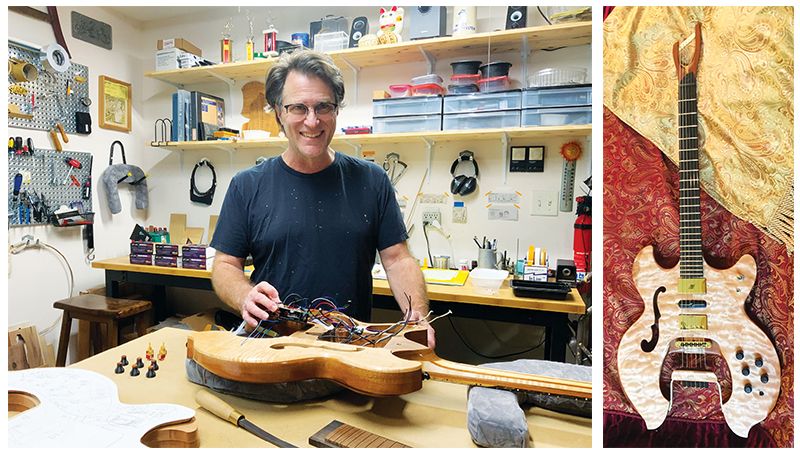Learn how he designed an instrument that looks just as good as it sounds

(Left) Luthier Jeff Whitehead has six custom guitars in production; (Right) The “Cross Star” features a patented harp headstock with tuners at the bridge on the other end of the guitar.
Professional luthier Jeff Whitehead has a background that’s as rich and varied as the sounds his exquisite custom instruments make. He’s a Charleston-based guitar builder, yes. But he also studied art at the University of Pennsylvania (and minored in chemistry). He’s a self-taught guitarist, but also a classically trained cellist. He’s a former military cadet. An electronics enthusiast. A software engineer. Whew! “My whole life, I’ve been multidisciplinary,” says Whitehead, who moved to the Holy City in 2011. “That’s just how I am.”
But it was “the art and science of building guitars” that allowed Whitehead to weave together that varied background. He started building them when he was 18. “The electric guitar is a very young instrument, and from my perspective as both an artist and a technologist, it’s a perfect platform to discover new frontiers,” he says.
His signature ax, the trademark-pending “Cross Star” guitar, is at the vanguard of those new frontiers. It is a striking instrument to behold, and to hold, thanks to its unique design: the gorgeously textured wood; the butterfly body shape; and, crucially, the tuning mechanism.
Unlike traditional guitars—which house tuning knobs in a headstock at the end of the fretboard—the “Cross Star” features a patented “harp” headstock, which looks just like that: a harp. The tuners, however, are at the bridge at the other end of the guitar. Whitehead says form follows function. With [traditional] guitar headstocks, he notes, “There’s a problem with weight from the tuners. There’s a problem with strength because of the angle, and all of those details affect the tone.”
The Cross Star’s tuning apparatus solves those problems. The strings “crimp themselves, and they’re locked in and don’t move,” Whitehead explains. Thus, they don’t go out of tune, giving you “incredible sustain, and beautiful acoustic tone without feedback,” he says.
Priced at $7,500, the “Cross Star” isn’t for everyone, but then again, it does things other guitars can’t. It’s not only an analog or electric instrument; it’s digital, too. “I’ve written a variety of MIDI software that allows you to have more control over the output,” Whitehead says.
It’s versatility that his clients seek. “You can play mellow jazz; you can play gritty humbucker; you can play smooth, Strat-y single coil; you can play acoustic—and now, with the MIDI software, you literally can play anything. It’s like putting an entire symphony into the hands of a guitarist.”
It takes Whitehead about six months to build a “Cross Star,” starting from raw blocks of wood, and he has a half-dozen in production. “I don’t want to make a lot of guitars; I want to make a few excellent guitars,” he says.
Lead Instrument